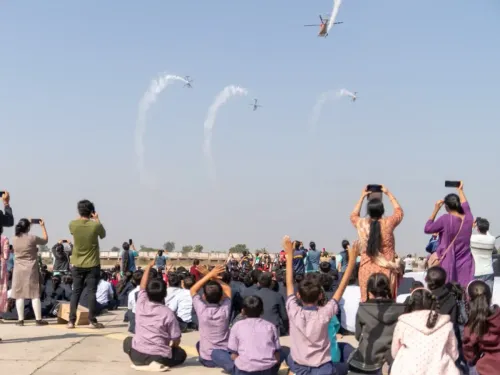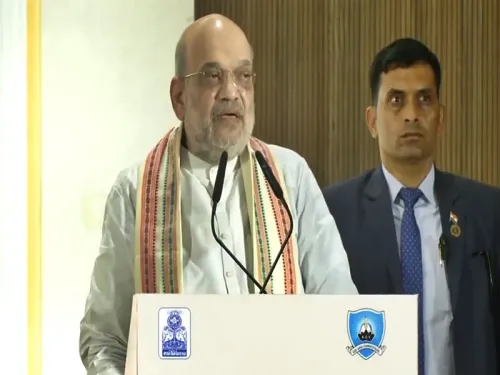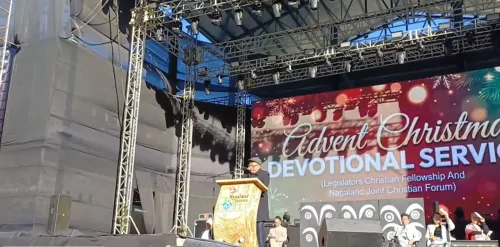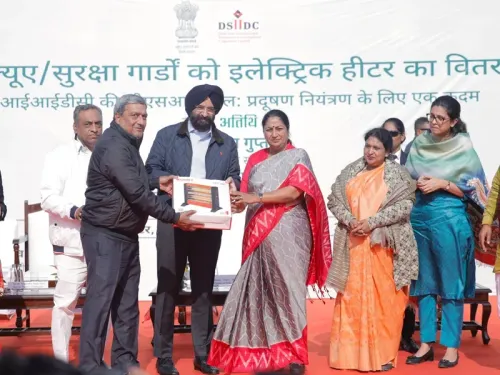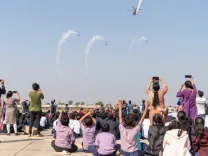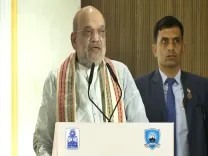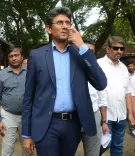Andhra CM: Temples as Key Revenue Sources for Development
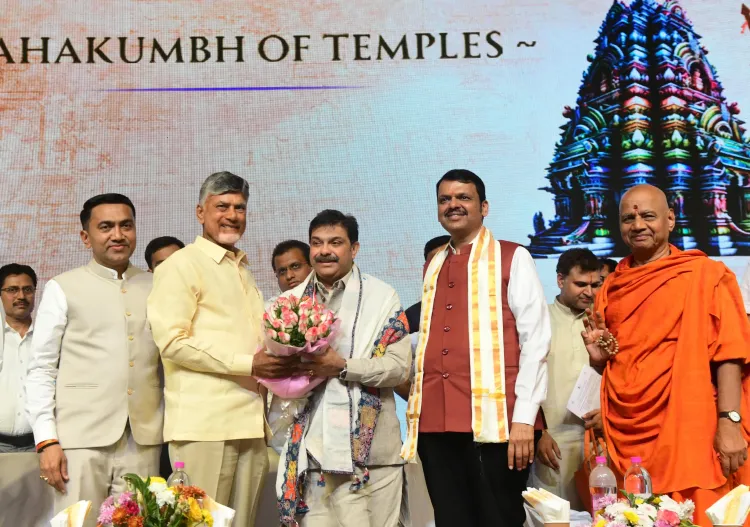
Synopsis
Key Takeaways
- Temples contribute significantly to economic growth.
- Integration of technology in temple management is crucial.
- Plans for Balaji temples in every state capital.
- Emphasis on community involvement in temple governance.
- Commitment to environmental sustainability and zero corruption.
Tirupati, Feb 17 (NationPress) Andhra Pradesh Chief Minister N. Chandrababu Naidu expressed on Monday that temples serve as spiritual hubs but also function as significant contributors to development funds.
While addressing the International Temple Convention and Expo (ITCX-2025) in this sacred city, CM Naidu emphasized the crucial role of temple tourism in advancing national progress.
The Chief Minister pointed out the transforming role of temples as economic and cultural centers, estimating the financial impact of temple-related activities in India at Rs 6 lakh crore.
CM Naidu outlined his vision for a self-sustaining, technology-enhanced temple ecosystem that merges faith with contemporary governance.
He remarked that there is a growing interest in spirituality.
"Numerous devotees are contributing crores of rupees. We are allocating these funds for the benefit of the underprivileged," he stated.
He reminded attendees of the Telugu Desam Party (TDP) founder and past Chief Minister Nandamuri Taraka Rama Rao's introduction of the 'Annadanam' initiative in 1983-84, which has since amassed a fund of Rs 2,000 crore at the Sri Venkateswara Temple.
Similarly, the Pranadanam scheme, initiated by him in 2003 with a fund of Rs 440 crore, continues to support life-saving initiatives.
The Chief Minister revealed plans for establishing Balaji temples in every state capital and key international cities to connect devotees and promote spiritual heritage on a global scale.
The TTD and ITCX are set to collaborate on enhancing the global presence of temples, he added.
Notable attendees at the ceremony included Maharashtra Chief Minister Devendra Fadnavis, Goa Chief Minister Pramod Sawant, and Union Minister of State for New and Renewable Energy Shripad Naik, among others.
The expo is welcoming representatives from 1,581 temples across various nations, with 685 virtual attendees. It features 111 speakers, 15 workshops, and 60 stalls.
Highlighting India’s pioneering position in technology adaptation, CM Naidu advocated for the integration of AI, digital innovations, and fintech solutions to enhance temple management.
He emphasized that although India leads in technological progress, faith remains indispensable.
"ITCX 2025 is centered around AI integration, sustainability, security, and financial transparency," the CM stated.
He urged for effective fund management, AI-driven surveillance, RFID-based tokens for crowd management, and digital governance to ensure smooth temple operations.
The Andhra Pradesh government has introduced initiatives such as an IVRS-based feedback system and mechanized sanitation to uphold temple hygiene.
The Chief Minister has proposed crucial reforms to bolster temple security and ensure sustainable temple management.
Efforts will include expanding Temple Trust Boards to encompass members from the Brahmin and Nayee Brahmin communities.
A specialized committee will be established to oversee temple security, while a Temple Tourism Committee involving Ministers from the Forest, Endowment, and Tourism departments will be set up to promote religious tourism.
He announced that the Dharmika Parishad will be reinforced under the Endowments Act to enhance governance.
Demonstrating the government’s dedication to temple conservation, Rs 134 crore from the Common Good Fund has been designated for temple renovations in the last seven months.
With 27,000 temples and 21 crore annual pilgrims, Andhra Pradesh stands as a spiritual powerhouse.
CM Naidu highlighted the importance of increasing 'archaka' (priest) compensation, raising the stipend for unemployed Vedic scholars to Rs 3,000, and ensuring greater autonomy in temple and Vedic matters.
"We are conceptualizing Amaravati as the dwelling of angels, inspired by Devendra's capital, and invite devotees to visit post their Balaji darshan," he said.
Furthermore, he committed to maintaining Tirumala's 75 percent green cover and fostering environmental sustainability.
"Serving God equates to serving humanity," he asserted, promoting temples as catalysts for social impact.
He reaffirmed his vow for zero corruption in temple management.
Acknowledging that the family unit is the nation’s greatest strength, he stated that temples play a vital role in safeguarding culture and heritage.
Maharashtra Chief Minister Devendra Fadnavis remarked on the rich historical significance of temples in the country.
"Foreign visitors are often amazed by the temples in South India. They question how such structures were constructed thousands of years ago," he noted, mentioning that students were educated on temple grounds.
CM Fadnavis highlighted that 55 percent of tourists engage in pilgrimage journeys.
"Temples are deeply intertwined with our culture. Their significance is integral to our lives," he stated.
Goa Chief Minister Pramod Sawant commented that while the Kumbh Mela is occurring in Prayagraj, a temple Kumbh Mela is simultaneously taking place in Tirupati.
"Though our states, cultures, languages, and attire may differ, we are united. Upholding Sanatana Dharma is a collective responsibility," he expressed, hoping such events would further the universality of Hindu Dharma.


